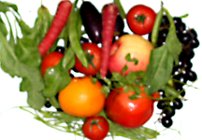Beta Carotene
Carotenes, especially beta-carotene, occurs abundantly in the natural plant world. It is estimated that more than 500 different carotenoids such as ß-carotene, α -carotene, lutein, cryptoxanthins, zeaxanthins, etc., are distributed throughout the plant and algae kingdoms. Although many of these have proven independent functions, around 50 or more can be metabolized to vitamin A inside the human body.
ß-carotene is the most prevalent carotenoid in the plant sources of the food chain and, for the same reason, is also known as pro-vitamin A.
Roughly, 6 µg (range varies widely 6-18 µg) of ß-carotene is equal to 1 RE (Retinol equivalents) or 3.33 IU of vitamin-A.

|
| Fruits and vegetables rich in ß-carotene. |
Beta Carotene Health benefits
Being an important flavonoid compound, beta-carotene has powerful antioxidant functions that help the body scavenge free radicals, and thereby limiting damage to cell membranes, DNA, and protein structures in the tissues.
Research studies suggest that dietary intake of foods high in ß-carotene has a positive association with decreased risk of cardiovascular disease as well as oral cavity and lung cancers.
Up on conversion to vitamin-A by the enzymes in the intestinal wall, it performs all the functions of vitamin-A such as visual cycle, reproduction (gametes production), maintenance of epithelial functions, growth, and development.
Natural sources of beta-carotene
Almost all the green-yellow-orange (GYO) vegetables and fruits are rich sources of beta-carotene. Some of the common vegetables/fruits/herbs/nuts per 100 g of weight with the highest content of ß-carotenes are:
| Vegetables: | ß-carotene/100 g |
| Brussel sprouts | 450 µg |
| Butternut-squash | 4226 µg |
| Carrots | 8285 µg |
| Collard greens | 3842 µg |
| Endive | 1500 µg |
| French beans | 379 µg |
| Kale | 9226 µg |
| Lettuce | 5226 µg |
| Mustard greens | 6300 µg |
| Pumpkin | 3100 µg |
| Spinach | 5626 µg |
| Sweet potato | 8509 µg |
| Swiss chard | 3647 µg |
| Tomato | 449 µg |
| Watercress | 1914 µg |
| Fruits: | |
| Apricots | 1,094 µg |
| Cantaloupes | 2,020 µg |
| Guava | 374 µg |
| Mango | 445 µg |
| Orange | 71 µg |
| Papaya | 276 µg |
| Persimmon fruit | 253 µg |
| Plums | 190 µg |
| Watermelon | 303 µg |
| Herbs: | |
| Basil | 3,142 µg |
| Cilantro | 3,930 µg |
| Parsley | 5,054 µg |
| Thyme | 2,264 µg |
| Nuts and seeds: | |
| Pistachio | 332 µg |
| Walnuts | 12 µg |
(Source: USDA National Nutrient Database).
Beta Carotene supplements?
The benefits of beta carotene supplements, however, have surprisingly unexpected results. Two large-scale prospective randomized studies on high-risk cigarette smokers; 1. ß-carotene (α-tocopherol, ß-carotene (ATBC) Cancer Prevention Study and, 2. the ß-carotene and retinal efficacy trial (CARET) found that ß-carotene supplementation indeed increased the rate of lung cancer in the group.
On the contrary, as mentioned above, high dietary intake of foods rich in ß-carotene is associated with a decreased risk of cardiovascular disease and cancers. However, ß-carotene supplementation appears harmful to health, especially in high-risk smokers.
Carotenemia
The consumption of excess plant sources of beta-carotene results in the deposition of carotenes in the skin, and tissues could lead to a harmless condition known as carotenemia. The state recedes in itself once foods rich in carotenes are withdrawn from the diet. (Medical disclaimer:
)≻≻-Back to Nutrition articles from Beta Carotene article.
Further reading and References:
Stanford School of Medicine Cancer information Page- Nutrition to Reduce Cancer Risk.